How to safely work in heat?
The Work, Health and Safety Act WA (2020) requires local governments (PCBUs) to ensure health and safety, so far as is reasonably practicable, by eliminating hazards and risks.

The Bureau of Meteorology (BOM) warns of an increased chance that the first tropical cyclone in the Australian region is likely to be earlier in the season. The country is at heightened risk of an above-average number of tropical cyclones until May 2023.
October to April is the peak time in Australia for flooding, tropical cyclones, heatwaves, bushfires and severe thunderstorms. According to BOM, this season, there is a greater than 70% chance of at least 11 tropical cyclones – the long-term average – as well as an elevated risk of grass fire and prolonged heatwaves in southern areas of Australia, with higher humidity.
We are very well aware of the havoc tropical Cyclone Seroja created in 2021, severely damaging homes, businesses, communications, road infrastructure and electricity service across a number of WA communities.
The Work, Health and Safety Act WA (2020) requires local governments (PCBUs) to ensure health and safety, so far as is reasonably practicable, by eliminating hazards and risks.
Local governments are subject to strict legal obligations, including those contained within the State Records Act 2000 (WA), to maintain records created or received in the exercise of their functions.
When considering high risk or high hazard assets, it is important to adopt a proactive approach while managing them. Due to resource constraints, property risks are commonly managed in a reactive manner after an incident, near miss, or workplace inspection by a regulator or LGIS.
Members can mitigate the risk of property damage by focussing or rather upgrading areas which are at high risk of getting damaged due to rain and accompanied wind, and further identifying other potential hazards around an asset.
Precaution needs to be administered in three stages – pre-season actions, immediate actions, and regular retrofits and upgrades.
The focus should be on aspects like roof inspections, securing control boards from water, storing chemicals above ground level, and cleaning and tightening of gutters.
These set of actions are different from the previous ones as they focus on implementations done right ahead of a cyclone warning. Preparedness measures include additional availability of fuel, finding proper shelter for vehicles, and disconnecting main electrical feeds to the facility.
Whether an asset falls under cyclone-prone zone or not, retrofits and upgrades are essential part of property maintenance. Therefore, members are advised to regularly inspect, maintain and repair any asset they own. This is important as many building materials deteriorate over a period of time, and their steel elements and reinforcement in concrete can corrode. Moreover, rot or termites can affect the timber used in the construction of an asset.
Resources for these actions are available on the LGIS website.
For more information please get in touch with your account manager.

LGIS receives approximately 1,300 claims on average each year; for the past five years, of those the vast majority are common law claims.

A decade’s long partnership between LGIS and the Royal Life Saving Society of WA (RLSSWA) has delivered benefits to the entire WA local government sector – but work still needs to be done to make sure that audit recommendations are actioned to keep aquatic centres safe.

The City of Perth engaged the LGIS injury prevention team
to evaluate workstations of a group of employees at their depot to make sure they were comfortable, safe and less likely to injure themselves.
LGIS is the unifying name for the dedicated suite of risk financing and management services for WA local governments, established by the WA Local Government Association in conjunction with JLT Public Sector (part of the Marsh group of companies). LGIS is managed by JLT Public Sector (ABN 69 009 098 864 AFS Licence 226827).
Risk Matters, via this website, is designed to keep members, their staff and elected members informed on topical risk management and insurance issues and LGIS programs and services.